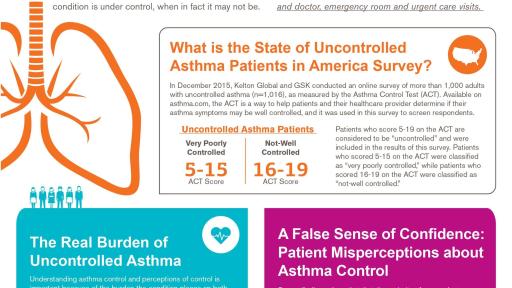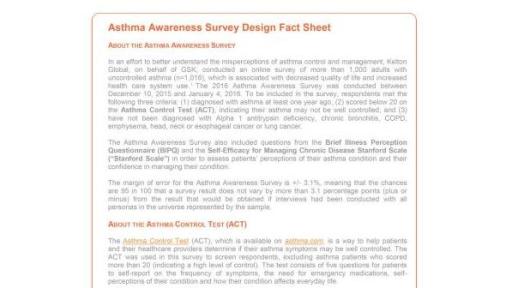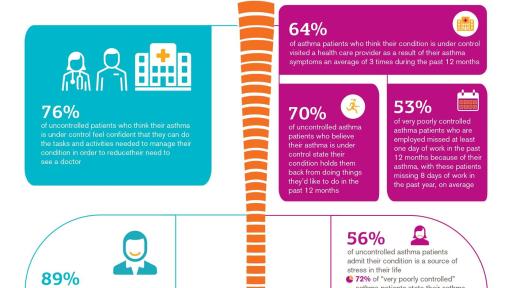National survey of uncontrolled asthma patients finds majority mistakenly believe their asthma is under control
New data show two-thirds of uncontrolled asthma patients in the US believe their condition is “under control,” suggesting a false sense of confidence in managing their condition
PR Newswire, RESEARCH TRIANGLE PARK, N.C., May 3, 2016
GSK today released data from a new national survey of more than 1,000 uncontrolled asthma patients showing that 67% of adults with uncontrolled asthma in the US are living with the misperception that their condition is under control. Results from the survey help provide a clearer view of how uncontrolled asthma patients in the US perceive and manage their condition. The survey results may suggest uncontrolled patients feel a false sense of confidence in managing their condition that may be driving recurring symptoms, and doctor, emergency room and urgent care visits.
The State of Uncontrolled Asthma Patients in America Survey, funded and developed by GSK, included 1,016 patients who scored 5-19 on the Asthma Control Test (ACT) – a level of asthma management considered to be “uncontrolled.” Patients who scored 5-15 on the ACT were classified as “very poorly controlled,” while patients who scored 16-19 were classified as “not-well controlled.”
The survey found that the misperception of control is pervasive, even when uncontrolled patients are grouped into those who are “not-well controlled”* and those with more asthma symptoms, or “very poorly controlled.” The findings show that among “not-well controlled” surveyed asthma patients, 78% believe that they actually do have their asthma under control. Among those classified as “very poorly controlled,” 55% reported thinking their asthma is under control. This misperception may prevent them from effectively managing their asthma.
“Understanding patient misperceptions of their degree of asthma control is critical to improving the quality of their asthma care,” said Mark Forshag, M.D., a pulmonologist and US Medical Affairs Lead at GSK. “The survey illustrates there is still a significant need to help patients go beyond merely coping with symptoms to managing their condition. We encourage patients talk to their doctor about proactively managing their asthma and appropriate treatment options.”
Overconfidence May Drive Recurring Symptoms and Doctor Visits
Seventy-six percent of respondents who think their asthma is under control feel confident that they can do the tasks and activities needed to manage their condition in order to reduce their need to see a doctor. However, 64% of these patients visited a health care provider as a result of their asthma symptoms, averaging three visits over the past 12 months.
While many uncontrolled asthma patients state they try to proactively manage their condition with medication and trigger avoidance, nearly three in four (74%) experience symptoms multiple times a week. Additionally, while 89% of uncontrolled asthma patients are confident they are capable of changing certain behaviors to better manage their condition, only one in two (50%) of these patients report having a clear understanding of their illness. This false sense of confidence suggests patients may lack the necessary tools to effectively engage in the management of their disease.
The survey found that recurring symptoms, lack of understanding, tools and resources may result in increased visits to the doctor, emergency room and urgent care due to their condition:
- One in five (20%) uncontrolled asthma patients needed to visit an emergency room or urgent care facility due to their condition in the past 12 months, which could present an opportunity to better educate uncontrolled asthma patients on disease management and treatment regimens.
- Surveyed patients with “very poorly controlled” asthma are nearly twice as likely to have visited an emergency room or urgent care facility in the last year due to their condition, compared to those with “not well-controlled” asthma (27% vs. 15%).
- Forty percent of those who used a rescue inhaler at least three times a day in the past month visited an emergency room or urgent care facility in the last year, compared to 18% of those who did not require a rescue inhaler this often.
The Physical and Emotional Toll of Uncontrolled Asthma
According to the survey, uncontrolled asthma takes a heavy toll on those with the condition, keeping many patients from living a full life and proving to be a frequent source of stress:
- Seventy percent of uncontrolled asthma patients who believe their asthma is under control go on to report that their condition holds them back from doing things they’d like to do – interfering with exercise (85%), sleep (78%), enjoyment of life (67%) and social life (45%) in the past 12 months.
- Fifty three percent of those who are employed missed work in the past 12 months because of their asthma, with these patients averaging eight missed days of work in the past year.
- More than half (56%) of uncontrolled asthma patients admit their condition is a source of stress in their life. A greater proportion of “very poorly controlled” asthma patients, compared to “not well-controlled” asthma patients, state their asthma causes them stress (72% vs. 43%) and say they worry about their asthma on a regular basis (66% vs. 37%).
About the GSK Asthma Awareness Survey
The State of Uncontrolled Asthma Patients in America Survey, conducted by Kelton Global on behalf of GSK between December 2015 and January 2016, included 1,016 patients who scored 5-19 on the Asthma Control Test (ACT) – a level of asthma management considered to be “uncontrolled.”
*Patients who scored 5-15 on the ACT were classified as “very poorly controlled,” while patients who scored 16-19 were classified as “not-well controlled.” Survey respondents were: (1) diagnosed with asthma at least one year ago, (2) scored below 20 on the Asthma Control Test (ACT), indicating their asthma may not be well controlled, and (3) have not been diagnosed with Alpha 1 antitrypsin deficiency, chronic bronchitis, COPD, emphysema, head, neck or esophageal cancer or lung cancer. The Asthma Awareness Survey also included questions from the Brief Illness Perception Questionnaire (BIPQ) and the Self-Efficacy for Managing Chronic Disease Stanford Scale (Stanford Scale). Results of any sample are subject to sampling variation.
Please click here for more information on the GSK Asthma Awareness Survey Design.
About Asthma
Current estimates indicate that as many as 242 million people live with asthma worldwide. It is estimated that in the US asthma affects 25.7 million individuals. For many of these patients, existing therapies can provide adequate control of their symptoms if used appropriately. However approximately 5% of patients with asthma cannot achieve symptom control with existing therapies.1
Poorly controlled asthma is a national health concern. It is linked to a number of additional health problems—such as obesity, pneumonia, lung infections and an increased risk of depression2—and costs the US $56 billion each year.3 In addition to overall annual costs of $56 billion in the US,4 direct and indirect costs are up to three to four times higher for severe asthma patients compared to mild asthma patients5,6 – highlighting the importance of treatment and control strategies.
Resources
People with asthma and those who care for them can visit www.asthma.com for additional information about managing the condition. Also available on Asthma.com is the Asthma Control Test™, a way to help patients and their healthcare provider determine if their asthma symptoms may be well controlled, and it was used in this survey to screen respondents. The test asks patients to answer five questions about frequency of symptoms, the need for emergency medications, self-perceptions of their condition and how their condition affects everyday life. The website also includes resources, such as an Asthma Action Plan, Doctor Discussion Guide and Asthma Journal to further assist patients. Asthma.com is funded and developed by GSK. The site is intended for US residents only.
About Kelton Global
The survey was conducted by Kelton Global, a leading global insights firm serving as a partner to more than 100 of the Fortune 500 and thousands of smaller companies and organizations. Utilizing a wide range of customized, innovative research techniques and staff expertise in marketing, branding, PR, media and business strategy, Kelton helps drive our clients’ businesses forward.
GSK – one of the world’s leading research-based pharmaceutical and healthcare companies – is committed to improving the quality of human life by enabling people to do more, feel better and live longer. For further information please visit www.gsk.com.
GSK enquiries:
| US Media enquiries: | Karen Hagens | +1 919 483 2863 | (North Carolina) |
|---|---|---|---|
| Juan Carlos Molina | +1 919 483 0471 | (North Carolina) | |
| Sarah Alspach | +1 202 715 1048 | (Washington, DC) | |
| Sarah Spencer | +1 215 751 3335 | (Philadelphia) | |
| Analyst/Investor enquiries: | Ziba Shamsi | +44 (0) 20 8047 5543 | (London) |
| Tom Curry | + 1 215 751 5419 | (Philadelphia) | |
| Gary Davies | +44 (0) 20 8047 5503 | (London) | |
| James Dodwell | +44 (0) 20 8047 2406 | (London) | |
| Jeff McLaughlin | +1 215 751 7002 | (Philadelphia) |
Cautionary statement regarding forward-looking statements
GSK cautions investors that any forward-looking statements or projections made by GSK, including those made in this announcement, are subject to risks and uncertainties that may cause actual results to differ materially from those projected. Such factors include, but are not limited to, those described under Item 3.D ‘Risk factors’ in the company’s Annual Report on Form 20-F for 2014.
Registered in England & Wales:
No. 3888792
Registered Office:
980 Great West Road
Brentford, Middlesex
TW8 9GS
____________________________
1 Am J Respir Crit Care Med 2000; 162:2341–51
2 O’byrne PM, Pedersen S, Schatz M, et al. The poorly explored impact of uncontrolled asthma. Chest. 2013;143(2):511-23.
3 Moore WC, et al. Characterisation of the severe asthma phenotype by the National Heart, Lung, and Blood Institute’s Severe Asthma Research Program. J Allergy Clin Immunol. 2007;11:405-413.
4 Moore WC, et al. Characterisation of the severe asthma phenotype by the National Heart, Lung, and Blood Institute’s Severe Asthma Research Program. J Allergy Clin Immunol. 2007;11:405-413.
5 Antonicelli L, et al. Asthma severity and medical resource utilisation. Eur Respir J. 2004;23(5):723-729.
6 Godard P, et al. Costs of asthma are correlated with severity: a 1-yr prospective study. Eur Respir J. 2002;19(1):61-67.




